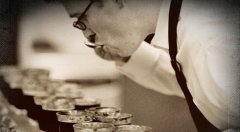General knowledge of Fine Coffee Culture French and Coffee Culture

There is a French proverb: "unjoursansfromage,cestunjoursanssoleil." It means that for the French, if there is no cheese, there will be no sunshine on that day. But I think that if one day they don't have coffee in their lives, they will be more listless than without sunshine and cheese. Coffee is indispensable to the daily life of the French. Coffee is not just a drink for them, it contains rich cultural connotations. Cafes all over cities and villages are a symbol of the French way of life.
If one day you go sightseeing in France and see those magnificent, simple and elegant, or mottled cafes on the colorful Champs-Elysees, the azure shores of the Mediterranean, or the quiet and lonely streets of the provinces, it is suggested that you might as well go in and enjoy the environment and atmosphere there. The French once conducted a survey of foreign tourists, and when asked what is the most attractive thing in Paris, many people's answer is not popular places of interest such as the Louvre and the Eiffel Tower, but cafes scattered on the streets of Paris. Someone once compared cafes to the skeletons of France, saying that if they were torn down, France would fall apart. Xu Zhimo also said, "if there are no cafes in Paris, I am afraid it will become nothing cute."
Looking back on the days when I was studying in France, when I was busy with schoolwork and working to earn tuition fees, it would not be too much to use an inch of time to describe it. At that time, the most luxurious and enjoyable enjoyment was that it was rare to stroll to the open-air cafe of the pedestrian street on a sunny afternoon, ask for a cup of hot coffee, sit down opposite the road, and carelessly look at all kinds of pedestrians passing by in the sun filled with the fragrance of coffee. That leisure and cozy beyond words, only personal experience will have a self-feeling.
The warm and unrestrained blood of the Latin nation flows through the veins of the French, and they are keen to talk and publicize themselves. In the medieval feudal dynasty, the French court was the center of French political and cultural life, and the salon of upper-class society always led the mass culture and life style of France. The relaxed, elegant, romantic and colorful way of life of the royal aristocracy has affected the interest of the public. Cafes inherit some of the communicative functions of aristocratic salons in the social life of the common people, especially intellectuals.
French people go to cafes not only for coffee, but also to relax. Ordinary people like to take part in the fun, parties or dinners, and like to go there where there are many people. No wonder in ordinary French restaurants, waiters usually place the first guests at a table by the window and light a small candle. When night falls, the guests outside can't help being attracted by the flickering candlelight and faint figure in the restaurant to share the warm air in the hall. Whether you are a learned philosopher, a frustrated scholar, a down-and-out artist, or a student after school, as long as you ask for a cup of hot coffee or other drink, you can relax there. Of course, it's all right to invite a few friends, colleagues or classmates to sit there and chat, exchange ideas, discuss homework and write homework. Some lonely people often come here to spend unbearable time, looking for spiritual comfort. The freedom, equality and fraternity advocated by the French are often condensed in this cafe, which is less than 100 meters square.
The Seine meanders through central Paris, with a bustling financial and trade district on the right bank and a culturally rich Latin district on the left bank, where there are many cafes, bookstores, art galleries, gallery and museums. The cafes on the streets of Montparnasse, St. Germain and St. Michel reached unprecedented prosperity at the beginning of the 20th century. They are sacred places and spiritual homes in the eyes of writers and artists all over the world. Picasso, Hemingway, Zola, Van Gogh, Joyce and Freud all weave their dreams here and spend their youth. Those who have not yet become famous, poor painters and writers from different countries will talk from morning to night in warm cafes, they talk and influence each other, and their thoughts and passions often collide with brilliant artistic sparks. create extraordinary works of art. When Picasso first arrived in France, he was cash-strapped and relied on worthless paintings in exchange for food and accommodation in the cafe. The kind boss never expected that the human care he gave to the painter would be so richly rewarded in the future. Hemingway said: "if you are lucky enough to go to Paris when you are young, it will follow you for the rest of your life wherever you go. Paris is a flowing feast."
The Cafe é degirode on Montparnasse Street is frequented by American writers Miller and Hemingway, Irish writer Joyce and Spanish painter Picasso. Today, Hemingway's usual chair is still there, and his name is engraved on the bronze medal on the back of the chair. The clove cafe has a specialty called Hemingway Pepper Steak. When many American tourists visit Paris, they have to go there.
The cafe é de Flore opposite St. Germain's Church and lesdeuxmagors, the dual cafe next door, are the places where existentialist masters Sartre and Beaufort discuss and write every day. It was sitting at the window facing the street at the Flower God Cafe that Beaufort wrote those warm love letters to her American lover Algren.
Leprocope Cafe is the first coffee shop to open in Paris. Three hundred years have passed, it still retains its simple and elegant traditional decoration. Voltaire and Rousseau, the thinkers of the European Enlightenment in the 18th century, and Diderot, the author of the world's first encyclopedia, wrote works here that influenced the process of revolution and social development in Europe and America. Robespierre, Danton and Mara, the three giants of the French Revolution, also talked with other revolutionaries about the ideal of changing society and drew their own blueprints. These brilliant names often enable us to trace the passing years more or less in the staggered time and space.
Relaxed and casual cafes will also make us sweep away the tiredness of the journey and immerse ourselves in French elegance and romance.
Important Notice :
前街咖啡 FrontStreet Coffee has moved to new addredd:
FrontStreet Coffee Address: 315,Donghua East Road,GuangZhou
Tel:020 38364473
- Prev

The etiquette of drinking coffee in the "Etiquette Book" of the dining table.
If you want to have elegant temperament, in addition to proper dress, proper behavior is also one of the necessary conditions. If you want to show a gentleman and lady demeanor at dinner, you must pay attention to some table manners. From entering the door, eating to the end, there are places that must be paid attention to in every link. Although it is a bit tedious, it is not too difficult. As long as you make use of the opportunity to practice and believe in training.
- Next

General knowledge of Fine Coffee Culture Coffee Culture in Vienna
Coffee is something that Viennese enjoy talking about and are quite proud of. The Viennese even compare it with music and waltz, which is called the three treasures of Vienna, which shows the relationship between Viennese and coffee. Some people say that Vienna is a five-step coffee, which may be an exaggeration by the poet, but it is true that there are a large number of Vienna cafes. Coffee kiosks for people to drink standing up from street corners,
Related
- How did the Salvadoran coffee industry develop in Central America?
- What exactly does the golden cup extraction of coffee mean?
- The Origin of Coffee flower
- [2023 Starbucks World Earth Day] there are more meaningful things besides free Starbucks coffee!
- What kind of coffee is there in Spain? 9 Flavors of Spanish Coffee
- Aromatic African coffee| Kenya's coffee culture and historical production area
- Liberica Coffee Bean knowledge: the characteristics of Liberian Coffee beans of the three original species of Coffee beans
- The origin and formula of Spanish latte introduces the taste characteristics of Bombon coffee in Valencia, Spain.
- How to adjust the solution of over-extracted coffee
- What is the tasting period of coffee beans? What is the period of coffee and beans? How should coffee wake up and raise beans?

